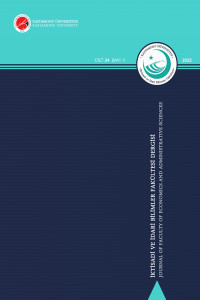Yabancı Sermayenin Türk Tarımındaki Yeri: 1980 Sonrası Doğrudan Sermaye Hareketliliğinin Dönüşüm Süreci ve Yabancı Sermayenin Tarım Sektörü açısından Gelecek Eğilimlerinin Belirlenmesi
Türkiye’de Cumhuriyet’in kuruluşundan 1980 yılına kadar olan dönem boyunca tarıma dayalı bir ekonomi benimsenmiş, nüfusun çoğunluğu tarım sektöründe istihdam edilmiş ve tarım korumacı politikalarla desteklenmiştir. 1980 sonrası alınan kararlarla birlikte serbest piyasa ekonomisine geçiş süreci başlamış ve tarımı desteklemeye yönelik politikalar da azaltılmıştır. 1980 sonrası uygulanan iktisat politikaları; üretimin, işgücünün, sermayenin ve sosyal politikaların yeniden yapılanmasını, dış ticaret ve mâli piyasaların ulusal ve uluslararası akımlarda serbestleştirilmesini hedeflemiştir. Ortaya konulan bu politikaların sektörel bazda farklı yansımaları olmuştur.
Bu çalışmada; 1980 sonrası Türk tarımın sektörel yapısı, Türkiye ekonomisindeki yeri ve 1980 sonrası yabancı sermayenin sektörel dağılımı ele alınmıştır. Bu kapsamda geçmişte uygulanan tarım politikaları kısaca ele alınıp, 2000 sonrası yapısal düzenlemeler, yabancı sermaye hareketlerinin dönüşüm süreci ve yabancı sermayenin gelecek eğilimleri değerlendirilmeye çalışılmıştır. Çalışma, yerli ve yabancı alan yazınından ve çeşitli kurumlardan elde edilen verilerden faydalanılarak hazırlanmıştır. Bu çalışma ile, bu alanda yapılanları bir araya getirerek mevcut eksiklikleri dile getirmek hem de gelecekte benzer konularda çalışma yapmayı düşünenlere yol gösterici olmak hedeflenmektedir.
The Role of Foreign Capital in Turkish Agriculture: Transformation Process of Direct Capital Mobility After 1980 and Determining Future Trends of Foreign Capital in terms of Agriculture Sector
In Turkey, during the period from the foundation of the Republic to 1980, an economy based on agriculture was adopted, the majority of the population was employed in the agricultural sector, and agriculture was supported by protectionist policies. With the decisions made after 1980, the transition to a free market economy started, and policies to support agriculture were reduced. Economic policies implemented after 1980 targeted the restructuring of production, labor, capital, and social policies, and the liberalization of foreign trade and financial markets in national and international flows. These policies executed have had different reflections on a sectoral basis.
This study discusses the sectoral structure of Turkish agriculture after 1980, its place in the Turkish economy, and the sectoral distribution of foreign capital after 1980. In this context, the agricultural policies implemented in the past were briefly discussed, and the structural arrangements after 2000, the transformation process of foreign capital movements and the future trends of foreign capital were tried to be evaluated. The study has been prepared using national and international literature and data from various institutions. This study aims to bring together what has been done in this field, express the current deficiencies, and guide those considering working on similar issues in the future.
___
- Mallampally, P., & Sauvant, K. P. (1999). Foreign direct investment in developing countries. Finance and Development, 36: 34-37.
Narin, M. (2011). Changes in Agricultural Policies After the 1980s. Economic Approach Congress Economic Approach Congress: Dynamics of Turkish Economy: Policy Quests.
